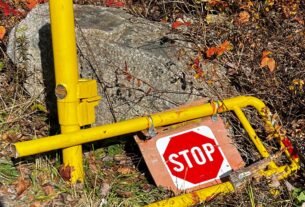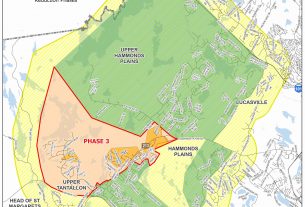**** CNS Media Release
Legislation Allows Stronger Rules for Short-Term Rentals
——————————
Changes to regulations for short-term rentals such as Airbnbs will help make more long-term housing available.
The amendments introduced today, October 12, enable higher registration fees to be set through regulations for short-term accommodations. The proposed changes will ensure that fees will be based on the size of the community where they are located. The Province will also increase fines for breaking registration rules.
“Nova Scotia is facing an unprecedented housing crisis. Building housing takes time. In the meantime, houses and apartments that could be long-term homes are being rented short-term,” said John Lohr, Minister of Municipal Affairs and Housing. “Every home counts.”
The Tourist Accommodations Registration Act will be renamed the Short-term Rental Registration Act.
Once amendments to the act are passed, the Province intends to bring forward changes to regulations in spring 2024. The regulations will include the following details:
— updated definitions
— higher annual registration fees for short-term rental accommodations such as Airbnbs, including homes, apartments and rooms in a home
— fees for units in a principal residence will be set at $10 across the province
— fees for units that are not located in someone’s home will range from $240 in the most rural communities to $3,600 in the centre of Halifax Regional Municipality
— fees for intermediate tourism zones and the borders of those zones will be determined through analysis and engagement
— higher maximum fines for operators and accommodations marketing platforms that don’t follow the rules
— an additional compliance and enforcement tool through an administrative penalties system.
The fee changes under consideration will not impact traditional accommodations such as hotels and motels, which will continue to range from $50 to $150 depending on the number of bedrooms.
Quick Facts:
— the Tourist Accommodations Registration Act came into effect in April 2020 and requires accommodations marketing platforms and operators that rent for 28 days or less to register with the Province every year by April 1
— in April 2023, accommodations within a host’s primary residence were added to the act, and platforms such as Airbnb and Expedia were required to list only accommodations with a valid registration number
— as of early October, there were more than 6,200 registered short-term accommodations in Nova Scotia
— on October 5, the government announced its intention to introduce these changes and transfer the registry to Municipal Affairs and Housing
— the Province has made more than $200 million in housing investments since 2022 to help Nova Scotians in need
Additional Resources:
Tourist Accommodations Registration Act: https://nslegislature.ca/sites
Tourist Accommodations Registry: https://beta.novascotia.ca/reg
Bills tabled in the legislature are available at: https://nslegislature.ca/legis
.
Legislation to Speed Up Housing Builds in Halifax Regional Municipality
——————————
The Province is taking steps to get more housing built, faster, in Halifax Regional Municipality (HRM).
Amendments to the Halifax Regional Municipality Charter and the Housing in the Halifax Regional Municipality Act introduced today, October 12, provide legislative authority to speed up development approvals, increase density and reduce barriers to housing builds in HRM.
“The need for more housing is urgent, especially in the HRM. All levels of government need to be bold, diligent and willing to do things differently to ensure we put forward solutions that give as many people and families as possible a place to call home, as quickly as possible,” said John Lohr, Minister of Municipal Affairs and Housing. “In order to truly address this housing crisis, we need more stock. We have an unprecedented housing problem, and the solutions need to be bold. This legislation gives the minister the authority to intervene on behalf of Nova Scotians when outdated policies and practices are slowing down construction and keeping them from accessing a safe and affordable home, faster.”
Amendments to the HRM Charter and the Housing in the Halifax Regional Municipality Act include:
— creating one of Canada’s first trusted partner programs, which will offer qualified developers – working with certified professionals who have a solid track record of quality developments – expedited services, allowing them to get shovels in the ground faster
— exempting critical healthcare facilities, including long-term care facilities, from land-use bylaws; this will allow urgently required beds to be built faster in communities that need them the most
— temporarily freezing all municipal permit and development fees, including Halifax Water regional development charges and density bonus charges, for a period of two years; any increase would require ministerial approval
— allowing more flexibility on unit mix for buildings
— increasing the minimum floorplan size for high-rise buildings
— reducing minimum lots sizes and increasing allowable coverage
— encouraging approval of HRM’s Suburban Plan, which is overdue
— accelerating development approvals by giving expert planning staff more authority
— giving the minister authority to make decisions on development in HRM without a recommendation from the Executive Panel on Housing or request from the municipality
— giving HRM the authority to unilaterally discharge existing development agreements that are more restrictive, to enable height and density
— granting all variances respecting set backs or street walls unless HRM can demonstrate that they materially alter the intent of the municipal planning strategy.
As part of this bill, regulations will be developed that will allow for more density and the use of more sustainable building materials.
The proposed changes support recommendations put forward in the HRM Housing Barrier Review (Deloitte Report), which identified barriers to the safe and rapid increase in housing supply.
Quick Facts:
— British Columbia, Quebec and New Brunswick have legislation that gives the minister or attorney general the power to override a municipal bylaw (often with conditions and often related exclusively to planning matters)
— the Province has invested close to $300 million to increase stock, enhance affordability, and provide more housing for Nova Scotians – faster
— the Minister on recommendation of the Executive Panel on Housing (HRM Task Force) has designated 10 special planning areas that will significantly speed up development in HRM and result in close to 23,000 new residential units
Additional Resources:
News release – Independent Report Makes Recommendations on Reducing Barriers to Housing Development: https://novascotia.ca/news/rel
Mandate letter of the Minister of Municipal Affairs and Housing: https://novascotia.ca/exec_cou
Bills tabled in the legislature are available at: https://nslegislature.ca/legis




